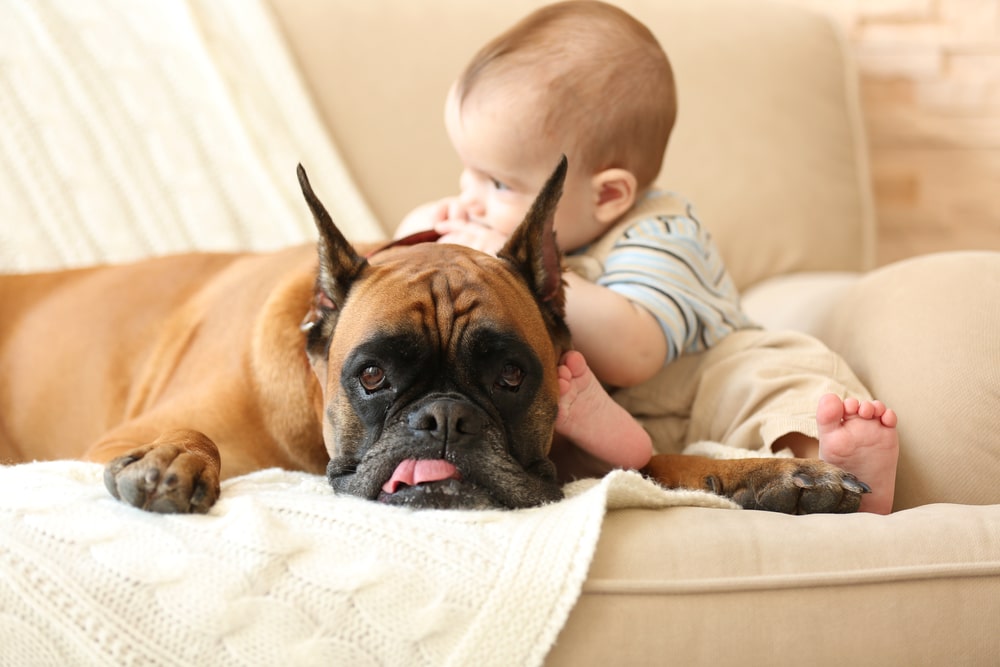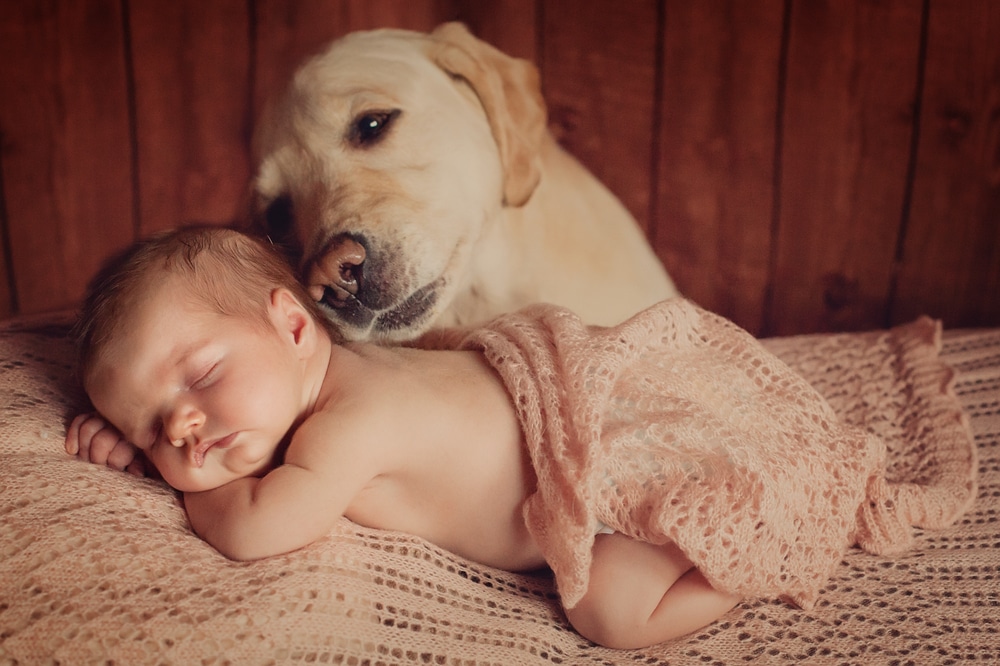It is obvious that dogs and people have a special bond; after all, dogs are often referred to as “man’s best friend.” They are adaptable creatures and can function even with young children. But are dogs good with babies too?
Canines are charmed by babies and can form strong bonds as an outcome of their prolonged interaction. A dog’s desire for attention and a baby’s need for a playmate is similar, particularly for young puppies. Dogs are also protective and loving. The unique relationship your child will develop with your dog might be beneficial to their development on a psychological and physical level. However, please always monitor your dog when it’s around your baby, just to be safe.
Table of Contents
Can Dogs Tell Babies Are Babies?
Many of us have seen that dogs act with babies differently than adults and older children. They frequently exhibit greater gentleness, curiosity, and protection.
It’s unlikely that dogs recognize an infant as a baby, but they are aware of the baby’s small size, fragility, vulnerability, and helplessness. Dogs actually treat babies in a manner similar to how they would treat puppies.
Although there is no concrete scientific proof, there is anecdotal evidence that dogs can distinguish between babies and adults too.
It’s typical to observe dogs acting more tenderly, protectively, with greater interest, or whining or barking. This tendency is caused by dogs’ ability to detect the size difference between adults and babies. This also includes the smell of babies, which differs from that of adults.
Tail wagging, barking or wailing, ears up when they hear a newborn cry, being close to the infant, excessive sniffing, and overall excited behavior is seen when dogs and babies interact.
Interestingly, dogs see children differently from adults despite the fact that they can sense, smell, and see toddlers but have no idea what they are.
Dog’s ears perk up whenever a baby cries. Additionally, if you keep the infant away from your dog, it can growl or bark at you.
Do Dogs Protect Human Babies?
Dogs have a natural urge for protection. It originates from their wolf ancestors, and with those genes and many years of selective breeding, they can recognize when a human child needs help. They are incredibly intelligent and are aware that their owner cares for them.
Whatever causes dogs to show an interest in young children, it is your duty as a dog owner to ensure that both infants and young children are safe when around your dog.
As a result, you must train your dog to act around kids and monitor all encounters closely.
A dog may not be able to recognize a baby as a baby, but it does not imply they will automatically accept them. Never leave your dog alone with a newborn though; always introduce them gradually, and watch how they interact. Continue to monitor them in all further interactions as well.
Can Dogs Be Gentle With Babies?

As a result of the time they spend together, dogs and babies can develop closeness. Dogs are usually really gentle with babies due to their closeness and size.
If you think about it, a dog and a baby enjoy playing and discovering their environment. If your dog and child were raised together, their relationship would be unbreakable.
When the infant is around, try to pay your dog a lot of attention. You can feed your dog at the same time you feed the infant. Try your best to bring the baby while you walk the dog.
Do Babies Love Dogs?
The fact is dogs make babies happy. Increased serotonin and dopamine levels are responsible for happy emotions, as shown when interacting with dogs.
One study found that we are predisposed to find puppies, kittens, and infants “cute”. According to the same study, which demonstrates that our affection for dogs outweighs that for cats and other people, dogs are unquestionably man’s best friend.
Babies are no different than us; they like cute faces and furry, fluffy things to touch.
Benefits Of Dogs And Children Growing Up Together
A ton of extremely convincing information demonstrates how having a pet may truly be advantageous in both the social and medical senses, especially if the babies are exposed to dogs from day one.
Constant Companionship
It can be challenging being a kid. Having a pet offers continual company through all of life’s ups and downs. Dogs may be a fantastic source of comfort even when children are dealing with challenging life lessons.
A More Active Outdoor Lifestyle
Owners of dogs exercise more. Today’s youngsters don’t leave the house as much, so having a dog around helps.
Dogs of most breeds are excellent exercise partners. Either by going for a stroll around the neighborhood or having a great time throwing balls in the backyard. All of these result in healthier children and them being more accustomed to an active lifestyle.
Learning Responsibility
Having a pet is a fantastic method to instill responsibility in kids. Children are initially exposed to responsibility and accountability when they ensure the family dog gets food and water, for example.
Opportunities To Talk
Kids have a ton of opportunities to practice talking with dogs. Kids will be eager to start conversing with their new companion, whether calling the dog by name or asking them to follow simple dog commands like sit or stay or just chattering.
Children with speech impairments can benefit from dogs’ calming and entertaining qualities too. They are great nonjudgmental talking partners, which makes speech therapy for children less challenging and more enjoyable.
Sum It Up: Are Dogs Good With Babies?
So, with everything said, are dogs good with babies? They can be caring and protective and bring a lot of smiles along the day. The baby benefits a lot from having a furry companion. So, yes, dogs are good with babies.
Would you agree with us that the best thing for a dog is a baby and vice versa? Let us know in the comments below!
